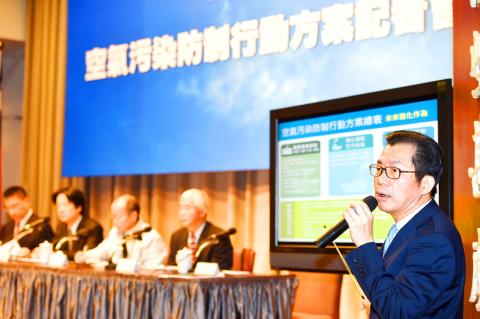In a bid to reduce air pollution, sales of motorcycles and cars with fossil fuel-powered engines are to be banned in 2035 and 2040 respectively, while buses are to be replaced with electric versions by 2030, the Executive Yuan said yesterday.
The vehicle electrification deadlines, as well as other pollution prevention measures, are part of a “red hazard reduction program” designed to reduce the number of “red alert” air pollution episodes by half by 2019.
“Introducing electric cars and motorcycles is a global trend. We can meet international deadlines [for introducing electric cars and motorcycles] if we import the vehicles from other nations. However, our deadlines allow a practical schedule for Taiwanese manufacturers, especially motorcycle [makers], to meet them,” Premier William Lai (賴清德) said when asked whether the across-the-board electrification could be accelerated.

Photo: Fang Pin-chao, Taipei Times
The nation’s operating power reserve can be boosted to 15 percent by 2019, meaning that there would be enough electricity to power electric vehicles, Lai said.
Environmental Protection Administration Minister Lee Ying-yuan (李應元) said the agency plans to retire 1.5 million motorcycles with two-stroke engines and 90,000 aging diesel trucks and buses by 2019.
The agency is to introduce more stringent emissions requirements by July 2020 targeting vehicles more than 10 years old that would no longer be tied to the emissions standards at the time of their manufacture, Lee said.
As there are about 10,000 buses in the nation, the Ministry of Transportation and Communications said it would provide subsidies of between NT$4 million and NT$6 million (US$133,387 and US$200,080) to replace them with electric buses, which cost between NT$7 million and NT$10 million each.
In a bid to reduce industrial emissions, four state-run businesses — Taiwan Power Co (台電), oil refiner CPC Corp, Taiwan (台灣中油), China Steel Corp (中鋼) and Dragon Steel Corp (中龍鋼鐵) — would be required to meet the most stringent environmental standards in the world, he said, adding that they would have to upgrade power generators and replace coal-fired units with gas-fired ones.
In a bid to reduce ship emissions, vessels in port would next year be required to use onshore power supplies and would be prohibited from using diesel generators, a major contributor to air pollution in port cities, Lee said, adding that at other times, ships would be required to use diesel with a lower sulfur content.
The Council of Agriculture is to subsidize products to accelerate the decomposition of agricultural leftovers that are often burned, such as rice straw, he said.
During peak pollution episodes, power plants in polluted areas would be required to run at a lower capacity as long as the nation’s operating reserves remain above 6 percent, Minister Without Portfolio Chang Ching-sen (張景森) said.
The proposed measures aim to reduce the number of red alert pollution episodes from 997 in 2015 to 499 in 2019.
As of Sunday, there had been 397 red alert episodes recorded this year, a 20 percent decrease from the 2015 level, Lee said.

ACTION PLAN: Taiwan would expand procurement from the US and encourage more companies to invest in the US to deepen bilateral cooperation, Lai said The government would not impose reciprocal tariffs in retaliation against US levies, President William Lai (賴清德) said yesterday, as he announced five strategies to address the issue, including pledging to increase Taiwanese companies’ investments in the US. Lai has in the past few days met with administrative and national security officials, as well as representatives from various industries, to explore countermeasures after US President Donald Trump on Wednesday last week announced a 32 percent duty on Taiwanese imports. In a video released yesterday evening, Lai said that Taiwan would not retaliate against the US with higher tariffs and Taiwanese companies’ commitments to

Intelligence agents have recorded 510,000 instances of “controversial information” being spread online by the Chinese Communist Party (CCP) so far this year, the National Security Bureau (NSB) said in a report yesterday, as it warned of artificial intelligence (AI) being employed to generate destabilizing misinformation. The bureau submitted a written report to the Legislative Yuan in preparation for National Security Bureau Director-General Tsai Ming-yen’s (蔡明彥) appearance before the Foreign Affairs and National Defense Committee today. The CCP has been using cognitive warfare to divide Taiwanese society by commenting on controversial issues such as Taiwan Semiconductor Manufacturing Co’s (TSMC, 台積電) investments in the

HELPING HAND: The steering committee of the National Stabilization Fund is expected to hold a meeting to discuss how and when to utilize the fund to help buffer the sell-off The TAIEX plunged 2,065.87 points, or 9.7 percent, to close at 19,232.35 yesterday, the highest single-day percentage loss on record, as investors braced for US President Donald Trump’s tariffs after an extended holiday weekend. Amid the pessimistic atmosphere, 945 listed companies led by large-cap stocks — including Taiwan Semiconductor Manufacturing Co (TSMC, 台積電), Hon Hai Precision Industry Co (鴻海精密) and Largan Precision Co (大立光) — fell by the daily maximum of 10 percent at the close, Taiwan Stock Exchange data showed. The number of listed companies ending limit-down set a new record, the exchange said. The TAIEX plunged by daily maxiumu in just

‘COMPREHENSIVE PLAN’: Lin Chia-lung said that the government was ready to talk about a variety of issues, including investment in and purchases from the US The National Stabilization Fund (NSF) yesterday announced that it would step in to staunch stock market losses for the ninth time in the nation’s history. An NSF board meeting, originally scheduled for Monday next week, was moved to yesterday after stocks plummeted in the wake of US President Donald Trump’s announcement of 32 percent tariffs on Taiwan on Wednesday last week. Board members voted to support the stock market with the NT$500 billion (US$15.15 billion) fund, with injections of funds to begin as soon as today. The NSF in 2000 injected NT$120 billion to stabilize stocks, the most ever. The lowest amount it